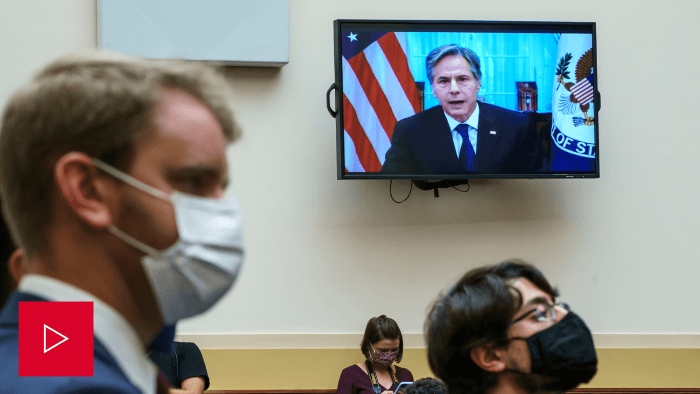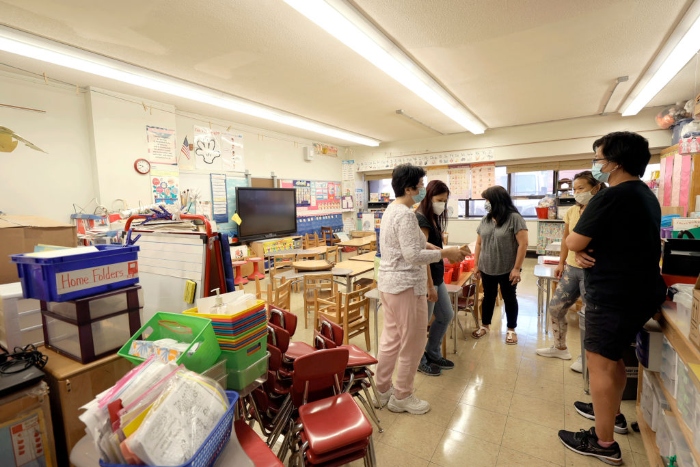| | |  | BY ELANA SCHOR | | With help from Myah Ward WATCHING THE CLOCK FOR QUITTING TIME — It shouldn’t be terribly surprising that no Biden administration official has resigned since the messy and deadly U.S. military withdrawal from Afghanistan last month. But the word “yet” might belong in that sentence, because Congress is only now launching oversight efforts that could turn up specific and serious details about how pivotal decisions were made during America’s winding down of its longest war. Resignations by senior administration officials happen when failures at the top become too overwhelming to avoid, or when a distinct personal error is laid bare in public — not a moment before. And when it comes to Afghanistan, the Biden administration simply isn’t close to that point. Illustrating that fact, Secretary of State Antony Blinken’s first round of testimony today before the House Foreign Affairs Committee largely pushed Democrats and Republicans into their respective corners to trade talking points.
| 
| Getting beyond partisan finger-pointing won’t be easy, but it also won’t be impossible. The images of forsaken Afghan allies waiting for U.S. help fleeing the Taliban-controlled country, not to mention the deaths of 13 troops in a terrorist attack, were devastating. They’ll only lead to personnel changes in the administration if Congress can pull off bipartisan oversight that puts one (or more) officials in the hot seat. Plenty of Afghanistan decisions the administration made in recent months merit more scrutiny, from the choice to shutter Bagram Air Base to the assumption that the heavily U.S.-funded Afghan army could hold off the Taliban for longer than it did. What lawmakers and the public don’t know yet is the backstory: whether political considerations or overt failures of judgment came into play as those calls were made. Despite the bipartisan criticism of the Biden administration’s withdrawal, there are reasons to doubt that lawmakers can pull back the curtain without descending into the capital’s usual bitter polarization. Looking back a few weeks, House Republicans lined up to call for the president’s resignation in the first days of the Afghanistan pullout, an easy if frivolous play to the base that peaked when some members called for the vice president and speaker to step down, too, given the line of succession. But costly missteps don’t always prompt quick departures by government officials. Just ask Katherine Archuleta, who stepped down as Office of Personnel Management director in 2015 only after weeks of congressional pressure following two massive data breaches, or Scott Pruitt, the Trump-era EPA chief who endured months of drip-drip ethical questions before resigning. Perhaps with that in mind, the GOP has been a little quieter on the resignation-calls front lately. Even so, in a bad omen for future cross-aisle cooperation, some Republicans who are hardly known for their partisan bomb-throwing continue to hypothesize about potential departures that would put Biden further on the back foot on Afghanistan. POLITICO’s Andrew Desiderio and Lara Seligman have a story that you can read tomorrow morning on the building Afghanistan accountability push that your Nightly host won’t spoil too much. But Rep. Mike Gallagher (R-Wis.), a former Marine intelligence officer and trusted national security voice for his party, told Andrew and Lara that Pentagon leaders such as Joint Chiefs of Staff Chair Gen. Mark Milley should have pushed back on the Bagram closure and stepped down if no one listened. If Milley warned against shutting Bagram, Gallagher said, “that strikes me as a moment where you throw your rank on the table and say, ‘Mr. President, this may be a lawful order but I disagree and I have to resign.’” Welcome to POLITICO Nightly. Reach out with news, tips and ideas for us at nightly@politico.com. Or contact tonight’s author at eschor@politico.com and on Twitter at @eschor.
| |
| | A message from the American Investment Council: Private equity is fueling the American recovery. The majority of private equity investment – 86% – went to small businesses last year to keep doors open and Americans employed during uncertain times. Private equity is supporting jobs in every state across the country, directly employing more than 11 million workers. This is why Congress should oppose a 98% tax increase on private investment. Learn more. | | | | | — Tensions mount between CDC and Biden health team over boosters: Top Biden Covid-19 officials are increasingly clashing with the CDC as the administration pushes to begin distributing booster shots widely by Sept. 20 . In meetings and conversations over the past month, senior officials from the White House Covid-19 task force and the FDA have repeatedly accused CDC of withholding critical data needed to develop the booster shot plan — delaying work on the next step of Biden’s vaccination campaign and making it more difficult to set clear expectations for the public. — Capitol Police arrest man with knives outside of DNC headquarters: U.S. Capitol Police arrested a California man on weapons charges after finding multiple illegal knives in a pickup adorned with white supremacist iconography near the Democratic National Committee’s Capitol Hill headquarters. Capitol Police said today that 44-year-old Donald Craighead was charged with possession of prohibited weapons after a patrolling Special Operations Division officer noticed that the Dodge Dakota did not have a visible license plate and pulled the driver over around midnight. Police said the officer then spotted a bayonet and machete, both of which are types of knives that are illegal in Washington, inside the truck. Capitol Police also said that Craighead espoused white supremacist rhetoric while he was pulled over. — Homeland Security chief of staff abruptly resigns: Karen Olick, chief of staff to Department of Homeland Security Secretary Alejandro Mayorkas, announced today that she will be leaving for a new, undisclosed opportunity. Jennifer Higgins, the current associate director of Refugee, Asylum and International Operations at U.S. Citizenship and Immigration Services, will step in as a temporary chief of staff until a new appointment is made, according to officials in the department. Olick plans to leave DHS at the end of the month.
| |
| | STEP INSIDE THE WEST WING: What's really happening in West Wing offices? Find out who's up, who's down, and who really has the president’s ear in our West Wing Playbook newsletter, the insider's guide to the Biden White House and Cabinet. For buzzy nuggets and details that you won't find anywhere else, subscribe today. | | | | | — Biden taps privacy advocate Alvaro Bedoya for FTC: Biden nominated privacy advocate Alvaro Bedoya for a seat on the Federal Trade Commission , an agency facing accusations of lax scrutiny of major tech platforms’ anti-competitive behavior and data practices. Bedoya would be one of three Democrats on the five-person commission, which oversees privacy, data security and some antitrust enforcement. Under Chair Lina Khan, a fellow Biden nominee, the FTC has laid out an aggressive enforcement agenda that could bring a flurry of new antitrust probes, lawsuits and rulemakings. — New York City schools fully reopen for the first time in more than a year: The city welcomed close to a million students back to in-person education — most of them for their first day in school since the Covid-19 pandemic set in . The reopening of classrooms came on the same day all municipal workers were ordered back to their offices and the city began enforcing a vaccine mandate for indoor businesses — a series of milestones in New York’s emergence from the pandemic that has hobbled the city since March 2020.
| |
| |  
| | | | | FALL BACK — Pandemic virtual schooling was pretty much universally maligned — by parents, kids and teachers. But in many ways, this fall’s back-to-school substitute is shaping up to be even worse, writes Nightly’s Myah Ward. Kids are still unvaccinated, and Delta hasn’t made things any easier. The result is a patchwork of safety plans as school districts institute mask mandates and strict quarantine protocols that could boot a kid from the classroom for 14 days with a common cold. But this time around, many districts don’t have the funding or resources to maintain both in-person and distance learning, so they’ve ditched the fallback virtual option altogether. “I think that parents still want schools to maintain a hybrid or a virtual option,” said Annette C. Anderson, deputy director of the Center for Safe and Healthy Schools at Johns Hopkins University School of Education. “But it’s very expensive for districts to stand up in-person learning, and then try to run hybrid or virtual alongside that.” The school districts in charge of drawing up these plans really haven’t thought this through, said Michael Gottfried, a professor at the University of Pennsylvania’s Graduate School of Education. Of course in-person learning is preferred, he said, but if you don’t have the “next best thing,” a students’ learning is going from “100 to zero, instantaneously.”
| 
Principal Alice Hom talks with teachers in a classroom at Yung Wing School P.S. 124 in New York City. | Michael Loccisano/Getty Image | Even before Covid, Gottfried studied absenteeism in school-aged kids. If you look at test scores for example, students perform worse when their classmates are absent. That’s because when children come back after missing school, teachers are spread thin trying to catch students up on old material, while keeping kids who didn’t miss any days engaged, he said. He worries these trends will be exacerbated by Covid, leaving students with yet another year of disrupted learning as they cycle in and out of the classroom during quarantine periods. “I just worry that it’s going to be like two weeks on, two weeks off. … Part of me is just like let’s just go back to Zoom for everyone,” Gottfried said. “I want to be in person more than anyone else. That is the last thing I want to do is sit on Zoom and teach. So I feel for these kids. But what kind of learning is it going to be without a real fallback plan in place?”
| |
| | HAPPENING WEDNESDAY - POLITICO TECH SUMMIT: Washington and Silicon Valley have been colliding for some time. Has the intersection of tech, innovation, regulation and politics finally reached a tipping point? Join POLITICO for our first-ever Tech Summit to explore the evolving relationship between the power corridors of Washington and the Valley. REGISTER HERE. | | | | | | | | |
| | | COVID CLEMENCY — The Biden administration has begun asking former inmates confined at home because of the pandemic to formally submit commutation applications , criminal justice reform advocates and one inmate tell POLITICO. Those who have been asked for the applications fall into a specific category: drug offenders released to home under the pandemic relief bill known as the CARES Act with four years or less on their sentences, Sam Stein writes. Neither the White House nor the Department of Justice clarified how many individuals have been asked for commutation applications or whether it would be expanding the universe of those it reached out to beyond that subset. But it did confirm that the president was beginning to take action. The requests from the administration are a concrete sign that the president is planning to use his clemency powers to solve what was shaping up to be one of the thornier criminal justice matters on his desk. The New York Times previously reported that such requests for applications would be coming. Since the spring of 2020, the Bureau of Prisons has released thousands of nonviolent federal inmates to home confinement citing concern about Covid-19 spread in their facilities. The rate of recidivism of that population has been extremely low, criminal justice reform organizations have said. But it was reported months ago that lawyers with the administration had determined that those on home confinement under the CARES Act would have to be returned to prison once an end to the pandemic was declared. Of the 7,000 or so inmates in that universe, an estimated 2,000 to 4,000 or so would likely have been sent back absent intervention. The remainder would have been close enough to the end of their original sentence that they could have remained at home.
| |
| | A message from the American Investment Council: Private equity is investing in America and fueling our recovery. The industry is supporting jobs in every state across the country, directly employing more than 11 million workers. Last year, private equity provided hundreds of billions of dollars to struggling companies to save jobs and help businesses make it through the pandemic. The majority of private equity investment – 86% – went to small businesses, and roughly a third went to businesses with just 10 workers or less.
Private equity is strengthening our country by pouring capital into infrastructure, renewable energy projects, and healthcare. According to the Wall Street Journal, “private-equity portfolio companies have been involved in nearly every step” of getting people vaccinated against COVID-19. And, because of these strong investments, PE is the highest returning asset class for public pensions for teachers, first-responders, and other public servants. Tell Congress to oppose a 98% tax increase on private investment. Learn more. | | | Did someone forward this email to you? Sign up here. | |
|
| | Follow us on Twitter | | | FOLLOW US
|
| |
